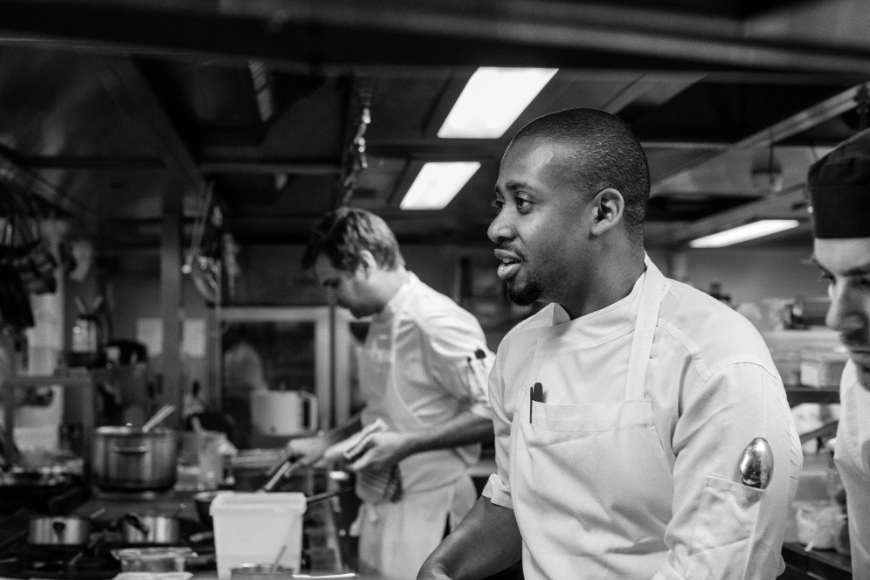
If you watch Great British Menu, you’ll recognise Mike Reid. If you don’t, here’s a quick introduction. After obtaining a BA in Business and Marketing, Mike decided to pursue a career in hospitality in London. An apprenticeship at The In & Out Club and a stint at the Royal Air Force Club led to roles at Le Gavroche and Restaurant Gordon Ramsay. In 2007, Mike joined the Gaucho team, rising through the ranks to become Group Executive Chef. Six years later, he moved to Melbourne for six months to ‘stage’ at some of the country’s top restaurants. Late 2014 saw Mike return to London to open M Restaurant; there are currently three branches. I sat down with Mike to chat about respecting the roots of our food, the impact of no-shows, poverty in London and a better work/life balance for chefs.
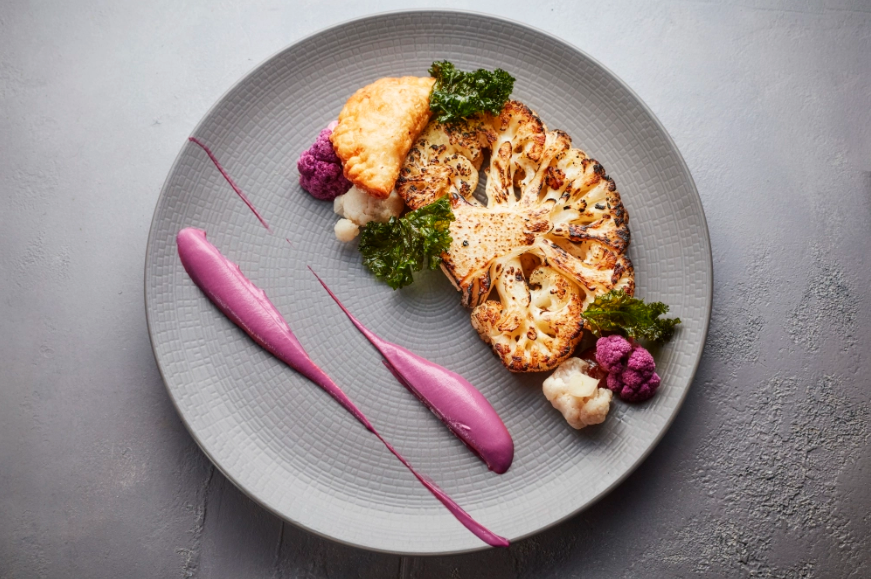
“My cooking style is about showcasing the best of produce.” Aside from the UK, which countries’ produce appeals to you and for what reasons?
Australian produce is incredible, especially in Tasmania: their beef, lamb, fruit and vegetables are among the best in the world. Simple things like cherries: you haven’t tasted a cherry until you’ve had a Tasmanian cherry! Another reason why I love it is that they get many influences from Asia as well, which is one of my favourite cuisines to cook.
Everything is just fresher. I met with one of my suppliers recently for M and said, “You have to do something about the avocados in this country!” The Australian ones are dark, rich, green, creamy and vibrant, whereas the ones we get in the UK tend to be from Africa or wherever and lack flavour and colour. I rarely eat them in London now because they just aren’t as they’re meant to be.
When you know what something should taste like, and in the context of its culture, it’s a gamechanger. I feel the same way about Mexican food. When I was younger, I backpacked around the Yucatán in Mexico for six months and spent time in Cancún, Playa del Carmen, Mérida, Valladolid and Tabasco. The food was insane, from street food and restaurants to the friends and family I stayed with. I struggle to eat Mexican food outside of Mexico because it’s interpreted as Tex Mex. There are very few places which can capture the flavour and authenticity, so the trip ruined me!
We’ve just bought our first van for events like the summer festivals that we usually take part in. It’s challenging, but I try not to replicate what we do at the restaurants; I try to create what M would be if we were a street food vendor. That’s how I always do our festival menus: I take the best of what we do, but mould it to a more informal style, such as tacos, soft shell crab or chicken karaage.
If you had only £10 to spend
on food, where would you spend it and on what?
Either London Fields or Borough Market, and I’d get some great street food;
you don’t need to spend loads to eat well. We’re very privileged in London because
we have so many amazing street food vendors who produce incredible food. Places
like Boxpark and Market Halls have got tasty, cheap and accessible food. We
needed to catch up with the likes of Thailand, Venezuela and New York, all of
which do it so well. They’ve made everyone up their game.
Which chefs would you most like to collaborate with and what do you admire about them in terms of their cuisines and characters?
I absolutely love what Bo Bech from Geist in Copenhagen is doing; I did a dinner with him in Australia not too long ago. He’s an incredible man and chef. We’re talking about doing something together in the next 12 months, either in London or Copenhagen. I’d also love to collaborate with James Knappett [Kitchen Table]; he’s a really nice guy, and a judge in my Young Chef competition. One of my favourite chefs is Andoni [Luis Aduriz] of Mugaritz in San Sebastian. I’ve been four times now and adore his food, so I’d love to do something with him one day.
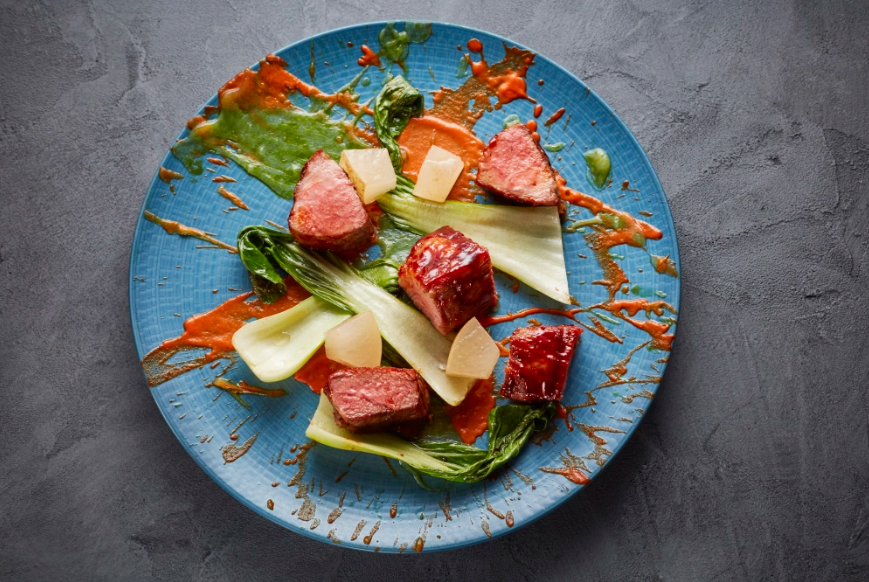
You worked with Heston Blumenthal for The Skinny Duck, a charity event for FareShare Australia to raise funds for disadvantaged children. Which UK charities do you support and why does their work speak to you?
School of Hard Knocks is one of the charities we work with and they offer great apprenticeship programmes which support kids through rugby. There’s also the Head and Neck Cancer Foundation and the Mayor’s Fund for London on their school kitchen projects.
When the latter approached me and told me their story, it genuinely broke my heart. Half a million kids in London alone are malnourished during school holidays: they won’t have the right food; many of them haven’t seen fresh produce before; some haven’t been taught about the foundations of cooking. We’re not talking about a faraway country: we’re talking about London. This is happening on our doorstep. It really blew me away, so we’re doing lots of fundraisers with them.
During school holidays, I also donate a lot of my time to cooking schools to teach the kids where their food comes from and what it looks like in all forms. I want to give them the skills to understand that you can eat fresh food and eat well without spending a fortune. Food isn’t cheap, but you can go to the bigger supermarkets or food markets and buy loose items instead of pre-packaged food. The way supermarkets package food makes things harder for everyone. There are ways around it, so it’s about educating them and their parents as well.
I’m very lucky to have been brought up in a family where my mum cooked every day. She’d take us shopping, so I was around food from a very young age. When I used to visit my grandparents in the Caribbean. They kept chickens and so I was taught how to pluck them, feather them, debone them, etc. So many people think that food just comes readily packaged. They think that fillet steaks are so lean, but they’re not: they’ve got a huge encasing of fat on top that we clean away. The leaner cut is rump. They ’re not seeing food in its original form and don’t know where it comes from anymore, which has affected how we eat. This puts pressure on our food supply chains as well.
I have a rule with my beef suppliers that we buy one prime to two secondary, e.g. if we want a fillet, we’ll also take a shoulder or a knuckle, or if we’re after a ribeye, we’ll get a chuck and a brisket. It’s so important to balance it out. I still have two prime cuts of Wagyu, but we also use a mix in our best-selling Scotch eggs. We take all the offcuts and parts that are hard to sell as a blend to make our signature dishes. Food waste is about moderation and eating smarter: you don’t need to make a beautiful curry with a chicken breast, or a beef curry using fillet. People always wonder why their meat is so dry and it’s because they’re using the wrong cut.
What has been your least extravagant purchase, but the one that’s had the most positive impact on your life?
My new runners – I run five times a week and they’ve changed my life. They’re not expensive, but they’re a quality pair and have made running much more enjoyable. Exercising puts me in the right frame of mind for work. When I go into work on the days where I haven’t gone for a run beforehand, it takes me a lot longer to get into a good place, whereas the endorphins get me there quickly.
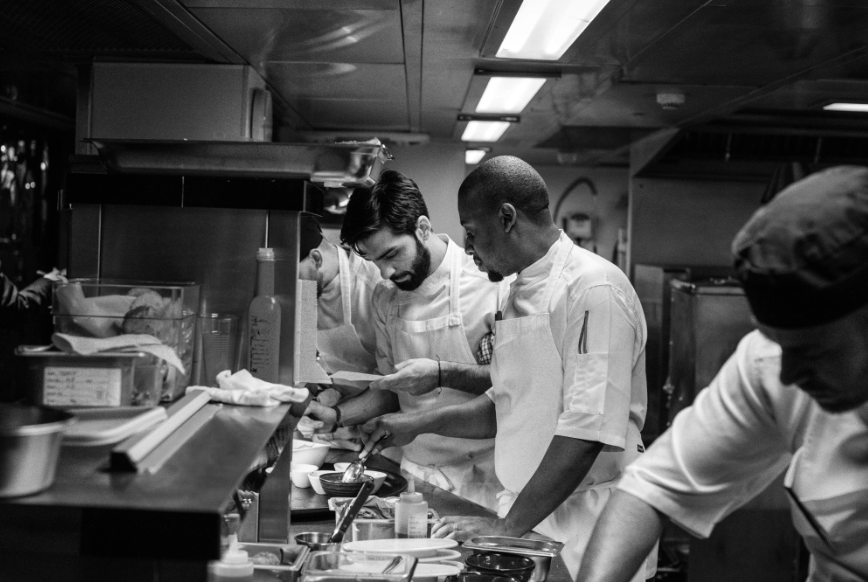
“If you don’t improve and get quicker, you won’t even be good enough for a job at McDonald’s.” These words from a former exec chef had a profound effect on you. What did you do to up your game?
Without that comment, I probably wouldn’t have made it. Do I thank him for it? Yes, but I think he could’ve done it in a better way. However, it did make me think, “Crap, I need to do better.” I had the talent and that’s the point he was trying to make. I understood the job and could do it, but I didn’t have consistency of pace: I would start quickly and then drop off. I improved by constantly challenging myself, setting myself targets for specific tasks. For example, I used to have to debone a partridge or grouse which we’d then stuff and it took me something ridiculous like 45 minutes the first time I did it. I’d then time myself every day to get faster. Within a week, I got it down to six minutes. It was perfectly removed with the leg bone still in and stuffed, rolled and tied.
I’m meticulous when I work and it’s still true to this day. If I do a job, I want to do it right first and then I work on the speed. I used to drive my chefs crazy with that, but it’s one of the reasons why I succeeded. I’ve never struggled with attention to detail and have never cut a corner.
It was a different world when I was coming through; the industry was changing. I still have scars on my arm from being burned, from not being quick enough, and this was only 17-18 years ago. We’ve come a long way in that time, which was needed. The new generation have a lot to be thankful for!
How can restaurants encourage a better work/life balance for their staff?
Re: work/life balance, there are two big hindrances stopping things from getting over the line. The first is the structure of restaurants, which are built around chefs working long hours. To change that, restaurants have to review their structure, model and profitability, and accept higher wage costs, or look at reducing other costs so that someone can work 10 hours instead of 18 hours. It’s incredibly tough in the industry right now and it’s hard to make these changes. Some restaurants are open for four days and closed for three days, which is a step in the right direction, but people are still working from 7am until 1am. They’re condensing 60-hour weeks into four days, so on the first day off, no-one gets out of bed. We need to make these changes to attract people to the industry: we’re experiencing a massive staff shortage because it isn’t attractive to them. And that’s not right because there are so many options for a successful career: you can learn incredible skills; earn very good money; travel; have your own business; become an MD, CEO or chef patron. The first five years look unappealing and discourage people from entering hospitality.
We also need to change our approach of how we train young chefs: they don’t respond to the way we were trained. Learning is very interactive and digital now, but so many kitchens haven’t changed in 20 years! At M, we started the Young Chef of the Year competition, where we’re trying to show these young talents what it takes to succeed. Firstly, you need to be an amazing chef, but there’s no point having a stellar menu if you can’t fill a restaurant. You need business acumen and marketing skills, be social media savvy and understand how to manage a team. This year, I’ve got commis chefs aged 18-20 who are costing sales, costing a recipe and doing order sheets. The skills are applied on the night when they run their own restaurant. It’s a fantastic opportunity for them.
The oldest is 29, so it’s funny to have a 10-year gap and see head chefs competing against commis. The former can be cocky, and they are talented, but in the previous two years, none of them have won. When I do their mentoring sessions, I bring them down to earth and explain that you can’t just turn up: if you don’t give it your all, they’ll beat you because they’ll do everything. They’re hungry; they haven’t made it yet. Are you here to win or compete? If I lose against an 18-year-old, I’m disappearing into a cave somewhere! There are a lot of chef competitions out there and they all play their part, but ours is different in that it’s modern and appeals to this generation more.
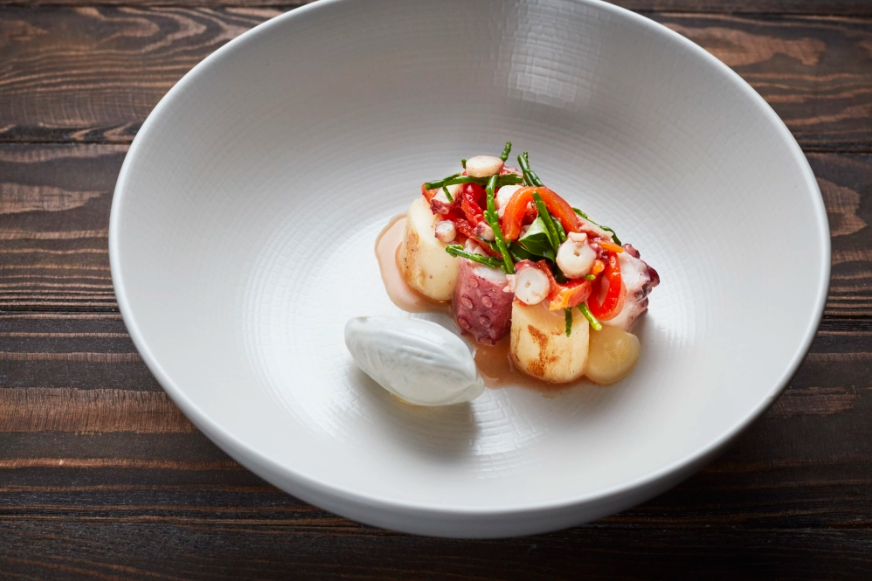
You’d been watching Great British Menu for a decade before you took part in 2017. Why did you want to take part in the series and what did you make of the experience?
I’d been watching it for years and was addicted to it: it’s a cooking show where chefs can learn. We don’t watch MasterChef or Bake Off because they’re created for the home cook. GBM is created for the home cook with the competitive element, but chefs can get ideas and inspiration from it. It’s great to see what the top chefs are doing.
When they approached me and I auditioned, I kept thinking that I wouldn’t get in. Then when I got the call, I was like, “OK, fuck! I’m opening a restaurant in six months, so probably shouldn’t have done this, but whatever!” It was incredible publicity for both me and the restaurant, but more than that, it was a great experience. I was on with Selin [Kiazim] and Tom [Kemble], both of whom I’m in touch with to this day; they’re great chefs and have gone to have amazing careers.
It’s also exciting to cook under that pressure. It felt like being a commis again, what with the pressure, the nerves, the heat – it was 44C in that studio! There were certain things you just couldn’t do, which is why lots of chefs go back and are successful: if you do it again, you know what not to do! I was proud of what I achieved, winning a dish and only going out by a point.
The veteran was Angela Hartnett and as soon as I saw her, I knew I was in trouble because my style is very different to hers. I knew she’d love Tom because he’s very traditional, whereas I had fermented courgettes done eight ways, which incidentally was the winning dish as I scored nine!
They do try to create a pressurised environment because it makes good TV. I’ll never forget dropping something on the floor and seeing someone run over thinking, “That’s so nice.” No – they wanted a close-up of my reaction! You’re also in an unfamiliar kitchen. You get a day before shooting to prep, but it’s not enough. We’ve all been head or exec chefs for years; I’ve been in my own kitchen for the past decade. Suddenly, you can’t find or operate a thing. Their vac machine didn’t have a soft air function and you can’t aerate without one. I tried to do a white chocolate Aero, but I couldn’t aerate it with their machine because it was an older model. I had to switch it off at the mains at the right time to get it to aerate then pray it’d hold until I got it into the blast chiller.
Are there any other TV shows on which you would like to appear and what do they mean to you?
Appearances on Saturday Kitchen and Sunday Brunch are great, but I never set out to make a career of it. For me, it’s about the restaurants and M has been my baby for the last five years. I’m also looking at opportunities in Australia as I’m there for half the year, so that’s my focus these days. I want to take my food to another level.
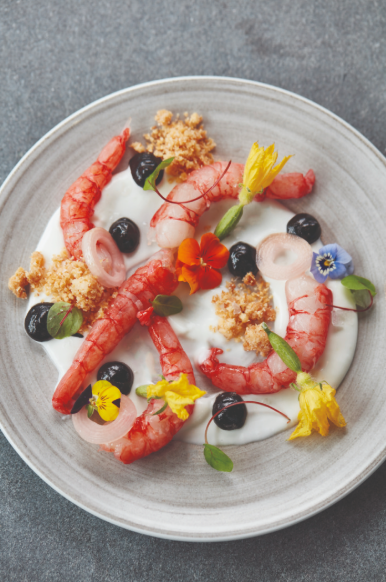
Today’s London is home to several top-quality steakhouses. How do you ensure that the menu and ethos at M sway diners’ decisions in your favour?
I didn’t want to open a steakhouse; it was the easiest comparison when myself and Martin Williams, the ex-exec chef and the ex-MD of Gaucho, opened a beef restaurant in the City. It was always going to be, “A new steak restaurant hits London,” but it was never solely about the beef and I think that’s how I’ve kept M and its food current and engaging.
For example, I think Goodman’s main course steak sales are around 90%, Gaucho’s are 92%, Hawksmoor’s is 88%, but M Threadneedle Street is 65% and M Victoria is 49%. We’re a restaurant with great beef rather than a beef restaurant.
The fun part of designing this menu was choosing six countries close to us in terms of their food and philosophies – Japan, France, South Africa, Australia, the US and Argentina – and making it about their beef and wine. We have courses from each country, so it’s very diverse and eclectic. There are no barriers as to what we can do. People want to have our miso black cod and our Iberico pork with kimchi and nashi pear. They’re drawn to those main courses as much as our 8-day Himalayan aged South African beef or the USDA prime fillet.
We have incredible produce on our menus. We’ve always wanted to make luxury accessible, and shout about our product and our core ethos. We won’t just use anything to get the best margins: we want to give you a taste of the best. Our fish is only Iki-jime or Open Blue Cobia, probably two of the most sustainable ways of fishing in the world. Iki-jime is relatively new to the UK and still only in a couple of top-end Japanese restaurants, but we worked tirelessly with Mark Eather [ethical seafood pioneer] to get his fish into the country from Australia. The quality of the fish is world-class, and these are the things which set us apart. You won’t have a crab on toast in M which is 24-day pasteurised white crab meat from wherever; you’ll have a 5-day aged Iki-jime Kingfish sashimi with pineapple, fermented roots and a miso dressing!
How do you think restaurants can reduce no-shows without alienating diners?
It’s tricky because we follow up on reservations 48 hours and then 24 hours in advance. We take credit card details for groups over 10, but many restaurants are starting to do it for much less, maybe even all bookings. It might be the best way of doing it now, but people don’t like it. We get resistance from groups who don’t want to do it, so how do you take action without losing the business? It almost needs to be an industry-wide initiative; everyone needs to say enough is enough.
In any other industry, it’s unacceptable. We’ve already purchased your goods. If you buy something online and it doesn’t get delivered for two days, you’ve already paid for it. If you booked dinner for a Wednesday evening on a Monday, we buy in your goods on the Tuesday. By Wednesday morning, we’re making your goods. Just because we finish it when you sit down doesn’t mean that it’s not already there. Aside from the costs, you’re taking that space away from two potential guests. The hospitality industry, for whatever reason, has always been judged through a different lens to others: there’s so much that we can’t get away with, or levels of expectation which just aren’t realistic.
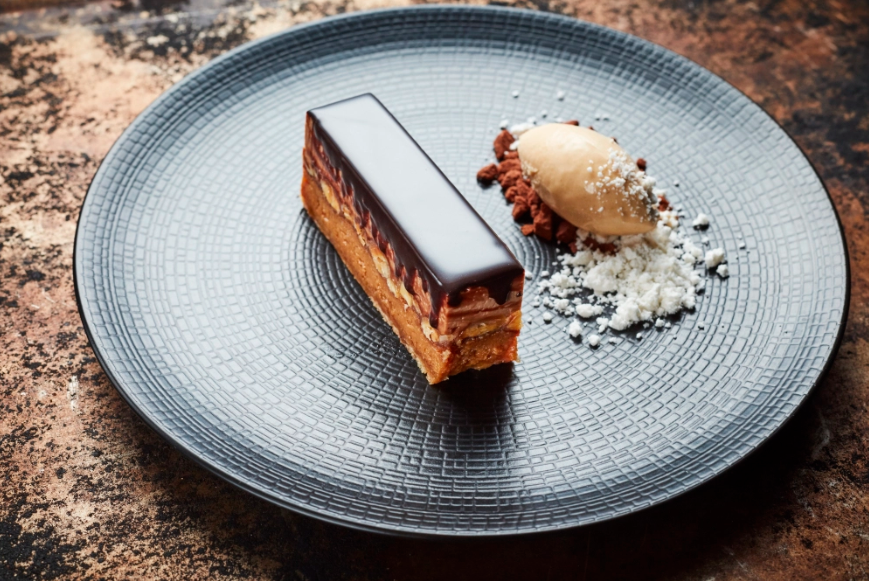
What are your pet peeves about the hospitality industry right now?
We just covered them! It literally drives me crazy. The sense of entitlement also annoys me, like when people are basically saying, “Well, what are you going to do to make me happy?” It’s not my job to make you happy; you’re coming out to enjoy your night and who you’re dining with. We’re here to give you an experience and welcome you into our house so to speak, but I can’t make you happy; I’m not your mother or your partner! They want so much and I just don’t get it.
What does success look like for you and why?
For me, success is taking a breath every now and again and looking at how far my restaurants and I have come, my family, my daughter, my wife, and allowing myself a moment to enjoy it. I don’t do often enough because I’m always looking at the next goal. I’m very proud of what I’ve accomplished so far and where we’re at.
Success is also sitting with my young daughter and taking it all in. She loves coming into the restaurants to see me and has been around them since she was born. She knows everyone and runs into the kitchen; I need to stop her from doing in other places! Seeing things through her eyes just levels me out. I’ve always been incredibly ambitious and determined to have a good career. Having a daughter hasn’t changed that, but I’m more balanced now. I still want everything I did before, but I’ll never miss out on time with her.
Does jealousy have value in driving humans to improve themselves or is it a purely negative emotion?
I think it’s completely negative. Having jealous thoughts means that you want something that someone else has got instead of being focused on yourself. Too many people focus on what others are doing, how they’re doing it and why and ignore what they’re doing with their lives and the decisions they’re making and whether they’re right or wrong. If you’re not concentrating your energy on your goals, then it’s a waste of your time. It’s a natural human emotion, but it’s about your mindset and focusing your energy when you feel yourself slipping down that hole.
It’s very hard, especially in this industry when you’re working 16-hour days and you lose the capacity to rationalise the more tired you are. I’ve improved over time; age gives you perspective. We all need to invest more time in ourselves and our mental health.
What do you consider a wasted life and why do you feel this way?
We all have days when we don’t achieve what we’d hoped to that day and you don’t get that time back. I try to approach each day with the same energy and focus. I set myself three daily goals so that each day counts. We only get to live this life once, which is very cliché, but it’s the truth. There are millions of reasons to push something to tomorrow, so you have to smash through that and ask yourself, “What do I want my life to be?” and work towards that. That’s the advice I give to young chefs and anyone who wants to listen to me ramble on!
If you liked this Mike Reid interview, you can check out more Spotlight on Chefs interviews here.
Links:
M Restaurants
Kitchen Table Review
Top 10 Pintxos Bars in San Sebastian
Best Pintxos Bars in San Sebastian
Kokotxa Review
PIN FOR LATER

